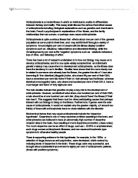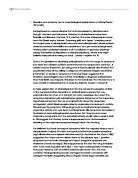The cognitive view is another psychological model. It focuses on how abnormal thought processes are linked to eating disorders, Garner and Bemis (1982) identify a number of cognitive errors or errors in thinking which underlie the behaviour of anorexics. They include ‘selective abstraction’ which involves selecting small parts of a situation and coming to conclusions on this basis whilst ignoring other evidence, for example ‘I am a very special person if I am thin’ and magnification’ which involves exaggerating the importance of events, for example, ‘Gaining a pound will push mw over the brink’. These kind of conclusions help to maintain the disorder. Cognitive errors are also found in bulimics (de Silva, 1995).
Cognitive models help to explain the maintenance of eating disorders. However, as with behavioural models cognitive models largely fail to explain why some dieters develop an eating disorder and some do not. That is, they are not very good at explaining the origins of eating disorders.
Despite the evidence supporting the view that psychological factors play some part in causing eating disorders there is also evidence to suggest biological factors may also influence their development. Holland et al (1984) found that if an identical twin suffered from anorexia their was a 55% chance that their twin would also suffer from the disorder. This compared with a 7% chance with fraternal twins. This would seem to suggest that being related to a person with an eating disorder means an increased risk of developing the disorder. This would be a non-psychological factor. However, these findings could reflect similarity in upbringing and not genetic similarity and so support a psychological view.
Give a brief account of the biological (medical) model of abnormality and consider its strengths and limitations (18)
The biological model regard psychological and behavioural abnormality as a sign or symptom of an underlying physical or organic disorder – usually some dysfunction of the brain or nervous system. There are various types of biologically based explanation for abnormality such as genetic inheritance, neurotransmitters or anatomy. Treatments for behavioural abnormality aim to treat the underlying physical dysfunction which should then effect a behavioural/psychological change, these include drug therapy, gene therapy, electroconvulsive therapy and brain surgery.
One strength of the biological model of abnormality is that in recent years advances in biochemistry and genetics have increased our understanding of the biological aspects of psychological disorders. However this understanding is far from complete. There are still many aspects which we do not understand.
Another strength is that many treatments for abnormality have been developed based on the biological model such as drug treatment. However drug treatment can have negative side effects, it can lead to physical and psychological dependence. In addition, it may only treat the symptom of a disorder rather than its cause. However, many psychiatrists argue that drugs can relieve extremely distressing symptoms and place people in a better frame of mind to overcome their disorder.
Supporters of the biological model would claim that another of its strengths is that it is a more humane model than alternatives. It portrays psychological disorder as an illness, that is, as something that just happens to a person. No blame is attached to the individual for suffering from the disorder. This contrasts with some approaches that imply that some people can not cope with life or have brought their disorder upon themselves. However critics are doubtful that it really helps to see a disorder as an illness since this encourages the ‘patient’ to depend on the ‘doctor’ and not to take any personal responsibility for their own recovery.
Consider whether research supports a link between stress and the immune system (18)
Kiecolt-Glaser et al (1995) used a volunteer sample of 26 women aged between 47-81 years. 13 of the women were carers and were placed in the experimental group, 13 were matched with the carers on the basis of age and income but not marital status and were placed in the control group. The ‘carers’ were women who were caring for relatives suffering from senile dementia, a task that has been shown to be associated with chronic stress. All participants were given a wound (‘a punch biopsy’). The wounds were dressed and treated by a nurse in the same way for each participant. The researchers also assessed levels of cytokynines – biochemical’s involved in regulating the bodies immune response. Participants were also given a 10 item perceived stress scale to check how stressed they actually felt.
They found that it took significantly longer for complete wound healing in the carers (an average of 9 days longer), cytokine levels were lower in the carer group and the carers did indicate they felt more stressed on the perceived stress scale. The researchers concluded that chronic stress depresses the functioning of the immune system because wound healing took longer in the carer group and cytokine levels were lower.
These findings do appear to support a link between stress and the immune system. The findings may also have important applications in medicine; they do imply that people who have undergone surgery, for example should avoid stress if their recovery is to be more effective. This particular research study does have some methodological drawbacks; the matching of participants was rather inexact, for example more of the carers were married and were non-smokers. However both of these participant variables are related to lower stress. Therefore this sampling bias would suggest that carers, if anything should have a better immune functioning. This actually serves to strengthen the validity of the findings and the conclusions of the researchers regarding the relationship between stress and immune system functioning.
The findings of the research are also corroborated by findings of others; studies of men and women who have recently been divorced or separated indicate poorer functioning of the immune system compared with married couples of similar age and social position. For example, immune cells from separated and divorced people do not reproduce as effectively from those of married counterparts (Kiecolt-Glaser et al, 1987). However, a whole range of factors other than stress may affect the immune system. These include general health, diet and age and whilst studies may attempt to control for such factors in order to isolate the effects of stress complete control is unlikely.
Despite this, there is considerable evidence that stress, particularly chronic or long-term, does suppress the immune system. This provides important explanation for the relationship between stress and the immune system.








